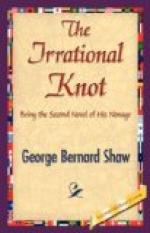Douglas consented; and they went to Queen Victoria Street, to a building which had on each doorpost a brass shield inscribed THE CONOLLY ELECTRO-MOTOR COMPANY OF LONDON, LIMITED. At the offices, on the first floor, they were received obsequiously and informed that Mr. Conolly was within. They then went to a door on which appeared the name of the inventor, and entered a handsomely furnished office containing several working models of machinery, and a writing-table, from his seat at which Conolly rose to salute his visitors.
“Good evening, Mr. Lind. How do you do, Mr. Douglas?”
“Oh!” said Mr. Lind. “You two are acquainted. I did not know that.”
“Yes,” said Conolly, “I had the pleasure of meeting Mr. Douglas at the Academy yesterday evening.”
“Indeed? Marian did not mention that you were there. Well, can we see the wonders of the place, Mr. Conolly; or do we disturb you?”
“Not at all,” replied Conolly, turning to one of the models, and beginning his showman’s lecture with disquieting promptitude. “Hitherto, as you are no doubt aware, Mr. Douglas, steam has kept electricity, as a motive power, out of the field; because it is much less expensive. Even induced magnetic currents, the cheapest known form of electric energy, can be obtained only by the use of steam power. You generate steam by the combustion of coal: electricity, without steam, can only be generated by the combustion of metals. Coal is much cheaper than metal: consider the vast amount of coal consumed in smelting metals. Still, electricity is a much greater force than steam: it’s stronger, so to speak. Sixpennorth of electricity would do more work than sixpennorth of steam if only you could catch it and hold it without waste. Up to the present the waste has been so enormous in electric engines as compared with steam engines that steam has held its own in spite of its inferior strength. What I have invented is, to put it shortly, an electric engine in which there is hardly any waste; and we can now pump water, turn mill-stones, draw railway trains, and lift elevators, at a saving, in fuel and labor, of nearly seventy per cent, of the cost of steam. And,” added Conolly, glancing at Douglas, “as a motor of six-horsepower can be made to weigh less than thirty pounds, including fuel, flying is now perfectly feasible.”
“What!” said Douglas, incredulously. “Does not all trustworthy evidence prove that flying is a dream?”
“So it did; because a combination of great power with little weight, such as an eagle, for instance, possesses, could not formerly be realized in a machine. The lightest known four-horse-power steam engine weighs nearly fifty pounds. With my motor, a machine weighing thirty pounds will give rather more than six-horse-power, or, in other words, will produce a wing power competent to overcome much more than its own gravity. If the Aeronautical Society does not, within the next few years, make a machine capable of carrying passengers through the air to New York in less than two days, I will make one myself.”




